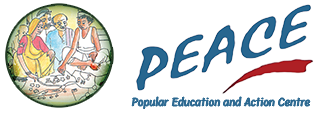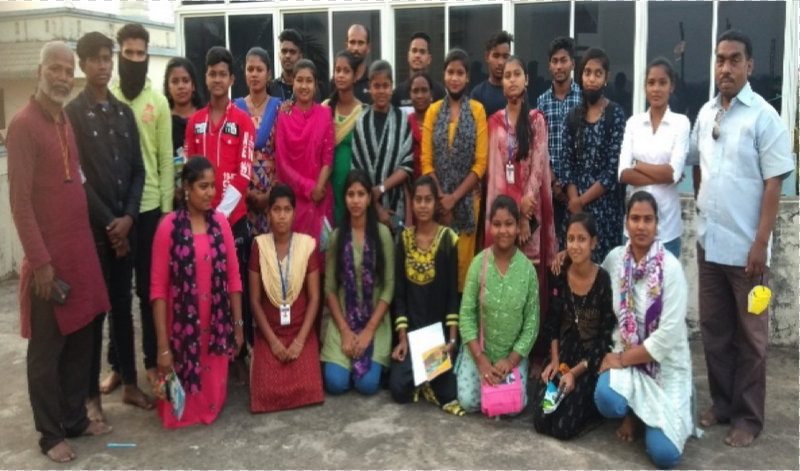Name of Fellow: Madhusmita
Genre: Social and Economic Justice
Area of Work: Bhubaneshwar, Odisha
Madhusmita goes by her first name only. Born and brought up in Bhubaneshwar in a family Dalit of social activist, she was exposed to social movements at an early age.As her mother was a social worker, hence she grew up in an environment of activism. It was her home where her mother’s friends would come to discuss about strategies about movements and also write a magazine on social issues. The magazine was Adhikar which she used to edit sometimes.At her home she would also hear about Dalit issues. Initially, she was not involved in those activities but when she was growing up, she started understanding the problems of Dalits.
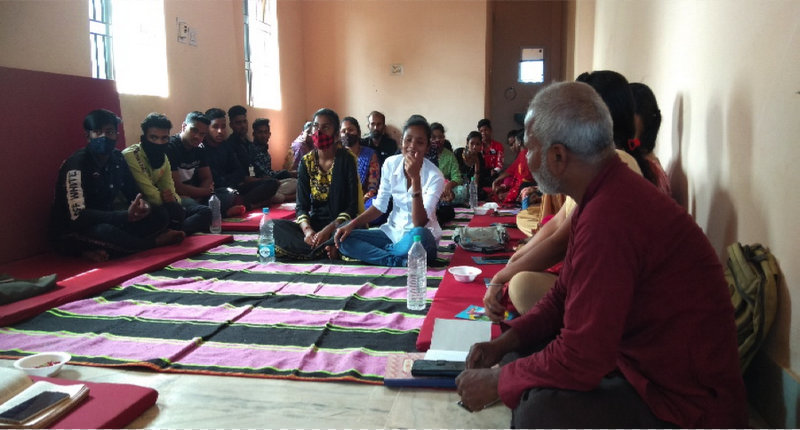
She shares that only Dalit people used to visit her home. Though the elders would gather at her house, their discussion would focus on issues pertaining to any matter that had happened in some village or someone was exploited. They would also discuss strategies about forming movements on these issues at her house and she started to listen to these strategies.The editing of stories and eves dropping into the conversations of her mother’s friends, she would learn about the caste-based discrimination and how Dalits faced harassment on daily basis. She learnt about land alienation of Dalits, exploitation of women and other social issues.This process inspired her so much that, when she was doing her graduation, she embarked on a train to attend a conclave of Safai Karmachari Andolan in Delhi. At that time, she had no idea about train journey but got into a train to Delhi for which a filmmaker had invited her. Without ticket and food, the young girl, boarded a general compartment and took a three-day long journey.
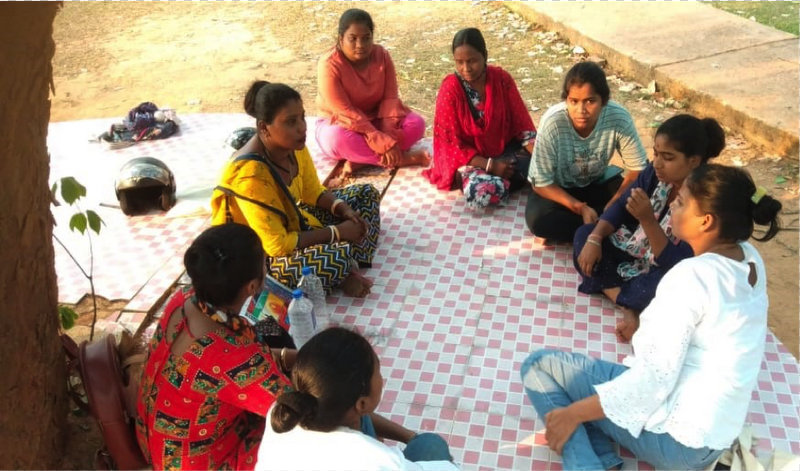
At the conclave she learnt about manual scavenging and how it was depriving Dalits of their right to a dignified life.After she came back home to Bhubaneshwar, she was a pumped-up person then. In 2006, after completing her graduation, she went on to expose the state authorities who had denied that manual scavenging was rampant in Odisha. In Khurda district’s Jatni village, Madhusmita went undercover to record evidence of manual scavenging. Initially rejected by the Dalit community, she built trust with the elderly women who were involved in cleaning dry toilets. The ladies then dressed Madhusmita like them and gave her a basket used to pick up human excreta. At 4 am in the morning to avoid the villagers’ notice, she accompanied one lady to a dry toilet and gathered evidence, in the form of photographs, and showed the authorities that manual scavenging was going on. Following her investigation, the women were relieved from manual scavenging and subsequently rehabilitated with some other cleaning work. This was the period when she was associated with Safai Karmachari Andolan.Later in 2010, she joined Dalit Foundation to highlight the issues of Dalit rights violation and manual scavenging.On the special request by renown Dalit rights activist, Wilson Bezwada, she again coordinated from the Southern state to bring the Dalit women volunteers to Delhi for a 4-day-long conclave. In the 45-day-long bus journey in the overcrowded bus, as Dalit women had joined the national movement, she managed to go through various villages to create awareness about manual scavenging, exploitation of Dalit women and violation of human rights through songs, and street plays— a journey she blissfully considers best learning.
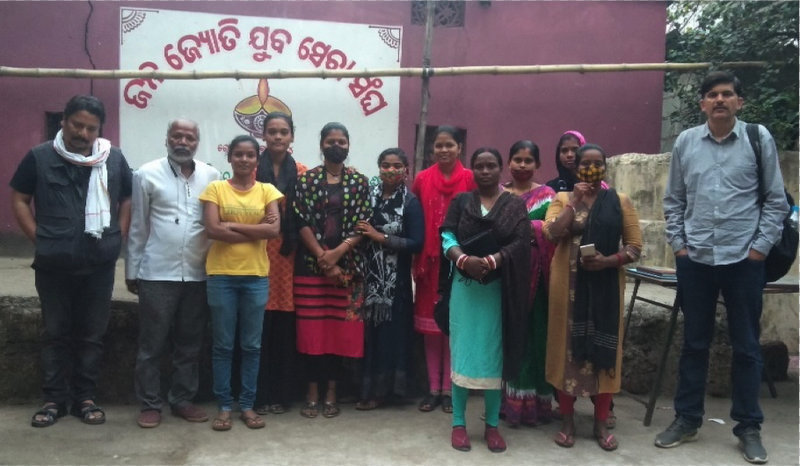
Since then, Madhusmita has been working as resource person to train about adolescent education, Dalit rights, manual scavenging, and sexual harassment to young girl children among others.She is presently working in three slums — Kadarpalli at Bapuji Nagar and Mahavir — in Bhubaneshwar on education, manual scavenging, Constitutional rights to provide the Dalit people awareness about how their rights are violated and how they are subjected to exploitation. Her work is particularly concerning as many male members of the slums are involved in drug trafficking and drug abuse.Madhusmita has formed a group named Garima Youth Club with 10 girls aged between 16-23 years in January. The club of girls will be trained on Constitutional values concerning the issues prevailing in the community like livelihood problems, untouchability, substance abuse, domestic violence, crime, etc. This club will in turn orient and facilitate womens’ self-help groups.
 She shares that only Dalit people used to visit her home. Though the elders would gather at her house, their discussion would focus on issues pertaining to any matter that had happened in some village or someone was exploited. They would also discuss strategies about forming movements on these issues at her house and she started to listen to these strategies.The editing of stories and eves dropping into the conversations of her mother’s friends, she would learn about the caste-based discrimination and how Dalits faced harassment on daily basis. She learnt about land alienation of Dalits, exploitation of women and other social issues.This process inspired her so much that, when she was doing her graduation, she embarked on a train to attend a conclave of Safai Karmachari Andolan in Delhi. At that time, she had no idea about train journey but got into a train to Delhi for which a filmmaker had invited her. Without ticket and food, the young girl, boarded a general compartment and took a three-day long journey.
She shares that only Dalit people used to visit her home. Though the elders would gather at her house, their discussion would focus on issues pertaining to any matter that had happened in some village or someone was exploited. They would also discuss strategies about forming movements on these issues at her house and she started to listen to these strategies.The editing of stories and eves dropping into the conversations of her mother’s friends, she would learn about the caste-based discrimination and how Dalits faced harassment on daily basis. She learnt about land alienation of Dalits, exploitation of women and other social issues.This process inspired her so much that, when she was doing her graduation, she embarked on a train to attend a conclave of Safai Karmachari Andolan in Delhi. At that time, she had no idea about train journey but got into a train to Delhi for which a filmmaker had invited her. Without ticket and food, the young girl, boarded a general compartment and took a three-day long journey. At the conclave she learnt about manual scavenging and how it was depriving Dalits of their right to a dignified life.After she came back home to Bhubaneshwar, she was a pumped-up person then. In 2006, after completing her graduation, she went on to expose the state authorities who had denied that manual scavenging was rampant in Odisha. In Khurda district’s Jatni village, Madhusmita went undercover to record evidence of manual scavenging. Initially rejected by the Dalit community, she built trust with the elderly women who were involved in cleaning dry toilets. The ladies then dressed Madhusmita like them and gave her a basket used to pick up human excreta. At 4 am in the morning to avoid the villagers’ notice, she accompanied one lady to a dry toilet and gathered evidence, in the form of photographs, and showed the authorities that manual scavenging was going on. Following her investigation, the women were relieved from manual scavenging and subsequently rehabilitated with some other cleaning work. This was the period when she was associated with Safai Karmachari Andolan.Later in 2010, she joined Dalit Foundation to highlight the issues of Dalit rights violation and manual scavenging.On the special request by renown Dalit rights activist, Wilson Bezwada, she again coordinated from the Southern state to bring the Dalit women volunteers to Delhi for a 4-day-long conclave. In the 45-day-long bus journey in the overcrowded bus, as Dalit women had joined the national movement, she managed to go through various villages to create awareness about manual scavenging, exploitation of Dalit women and violation of human rights through songs, and street plays— a journey she blissfully considers best learning.
At the conclave she learnt about manual scavenging and how it was depriving Dalits of their right to a dignified life.After she came back home to Bhubaneshwar, she was a pumped-up person then. In 2006, after completing her graduation, she went on to expose the state authorities who had denied that manual scavenging was rampant in Odisha. In Khurda district’s Jatni village, Madhusmita went undercover to record evidence of manual scavenging. Initially rejected by the Dalit community, she built trust with the elderly women who were involved in cleaning dry toilets. The ladies then dressed Madhusmita like them and gave her a basket used to pick up human excreta. At 4 am in the morning to avoid the villagers’ notice, she accompanied one lady to a dry toilet and gathered evidence, in the form of photographs, and showed the authorities that manual scavenging was going on. Following her investigation, the women were relieved from manual scavenging and subsequently rehabilitated with some other cleaning work. This was the period when she was associated with Safai Karmachari Andolan.Later in 2010, she joined Dalit Foundation to highlight the issues of Dalit rights violation and manual scavenging.On the special request by renown Dalit rights activist, Wilson Bezwada, she again coordinated from the Southern state to bring the Dalit women volunteers to Delhi for a 4-day-long conclave. In the 45-day-long bus journey in the overcrowded bus, as Dalit women had joined the national movement, she managed to go through various villages to create awareness about manual scavenging, exploitation of Dalit women and violation of human rights through songs, and street plays— a journey she blissfully considers best learning. Since then, Madhusmita has been working as resource person to train about adolescent education, Dalit rights, manual scavenging, and sexual harassment to young girl children among others.She is presently working in three slums — Kadarpalli at Bapuji Nagar and Mahavir — in Bhubaneshwar on education, manual scavenging, Constitutional rights to provide the Dalit people awareness about how their rights are violated and how they are subjected to exploitation. Her work is particularly concerning as many male members of the slums are involved in drug trafficking and drug abuse.Madhusmita has formed a group named Garima Youth Club with 10 girls aged between 16-23 years in January. The club of girls will be trained on Constitutional values concerning the issues prevailing in the community like livelihood problems, untouchability, substance abuse, domestic violence, crime, etc. This club will in turn orient and facilitate womens’ self-help groups.
Since then, Madhusmita has been working as resource person to train about adolescent education, Dalit rights, manual scavenging, and sexual harassment to young girl children among others.She is presently working in three slums — Kadarpalli at Bapuji Nagar and Mahavir — in Bhubaneshwar on education, manual scavenging, Constitutional rights to provide the Dalit people awareness about how their rights are violated and how they are subjected to exploitation. Her work is particularly concerning as many male members of the slums are involved in drug trafficking and drug abuse.Madhusmita has formed a group named Garima Youth Club with 10 girls aged between 16-23 years in January. The club of girls will be trained on Constitutional values concerning the issues prevailing in the community like livelihood problems, untouchability, substance abuse, domestic violence, crime, etc. This club will in turn orient and facilitate womens’ self-help groups.